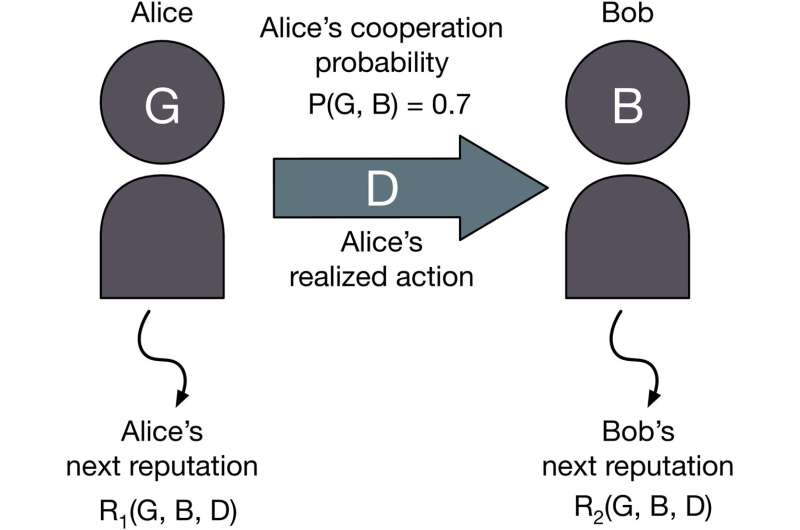This article has been reviewed according to Science X's editorial process and policies. Editors have highlighted the following attributes while ensuring the content's credibility:
fact-checked
peer-reviewed publication
trusted source
proofread
Study describes evolution of double-sided social norms for cooperative interactions

In addition to describing biological interactions, evolutionary theory has also become a valuable tool to make sense of the dynamics of social norms. Social norms determine which behaviors should be regarded as positive, and how community members should act towards each other.
In a recent publication, published in PLOS Computational Biology, researchers from RIKEN, Japan, and the Max-Planck-Institute for Evolutionary Biology (MPI) describe a new class of social norms for cooperative interactions.
Social norms play an important role in people's everyday lives. They govern how people should behave and how reputations are formed based on past behaviors.
In the last 25 years, there has been an effort to describe these dynamics of reputations more formally, using mathematical models borrowed from evolutionary game theory. These models describe how social norms evolve over time—how successful norms can spread in a society and how detrimental norms fade.
Most of these models assume that an individual's reputation should only depend on what this person did in the past. However, everyday experience and experimental evidence suggest that additional external factors may as well influence a person's reputation. People do not only earn a reputation for how they act, but also based on who they interact with, and how they are affected by those interactions.
For example, with a recent series of experiments, researchers from Harvard University have shown that victims of harmful actions are often regarded as more virtuous than they actually are. To explore such phenomena more formally, researchers at the MPI for Evolutionary Biology in Plön and RIKEN, Japan, have developed a new mathematical framework to describe social norms.
According to the new framework, when a person's action affects the well-being of another community member, the reputations of both individuals may be updated. Using this general framework, the researchers explore which properties such norms ought have to support cooperative interactions. Surprisingly, some of these social norms indeed have the property observed in the earlier experiments: when one individual defects against another, the victim's reputation should improve.
Moreover, the researchers also observe a fundamental trade-off. Norms that are particularly good in sustaining cooperation tend to be less robust with respect to noise (such as when reputations are shaped by third-party gossip).
Overall, this work is part of a bigger effort to understand key properties of social norms in a rigorous manner. These studies shed light on which ecological and social environments facilitate cooperation, and on the effects of social norms more generally.
More information: Yohsuke Murase et al, Indirect reciprocity with stochastic and dual reputation updates, PLOS Computational Biology (2023). DOI: 10.1371/journal.pcbi.1011271
Journal information: PLoS Computational Biology
Provided by Max Planck Society



















